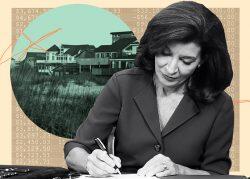East End voters — with two exceptions — approved a real estate transfer tax to fund affordable housing.
Three towns — East Hampton, Southampton and Southold — backed the 0.5% levy by fairly comfortable margins, according to unofficial election results.
The exceptions were Shelter Island, where absentee ballots must be counted to determine the result, and Riverhead, where town officials declined to put the measure on the ballot. The transfer tax will be imposed on property sales in the towns that approved it.
Read more


The unofficial count on Shelter Island was 881 votes in favor and 889 against. Lawn signs for and against the proposition peppered the island in the weeks leading up to the vote. Most of the island’s large weekend population is registered to vote elsewhere and did not get a say.
Meanwhile, the referendum passed 59 percent to 41 percent in Southold, 53 percent to 47 percent in Southampton and 69 percent to 31 percent in East Hampton.
Proponents hailed the tax as a way to provide housing for workers who staff businesses and service properties on the East End but can’t afford to live there. Low-level transactions and some individual deals may be exempted from the tax.
The measure is modeled after a 2 percent real estate transfer tax that replenishes the Community Preservation Fund in all five East End towns. That account is used to purchase land and easements, preserving farmland and open space but also making housing more expensive by limiting development.
Tuesday’s results don’t mean apartments and attached homes will be springing up on the North and South forks any time soon: Zoning still forbids such development on nearly all land, and rezoning to create pockets of affordability tends to generate fierce opposition.
That was evident during the run-up to this year’s election, when lawn signs declared “No high-density housing.” Some signs said “Vote NO now, re-vote later after housing plan,” but no other vote is scheduled.
The new tax has been considered in the Hamptons for decades, but momentum rose as the affordable housing crisis in the region worsened. The so-called “trade parade” shows little sign of abating as workers endure long commutes to the region from points west.
Last year, Gov. Kathy Hochul signed a bill championed by Assemblymember Fred Thiele to put the tax on the ballot. (Her predecessor, Andrew Cuomo, had vetoed the bill.) Thiele, a Hamptons resident who fought off a Republican challenger to win another two-year term Tuesday, has said it would have generated $30 million had it been in effect for 2020.
